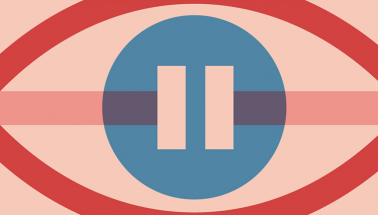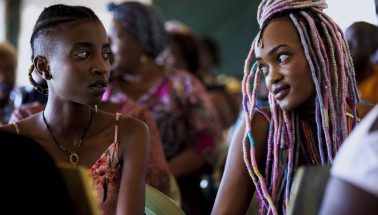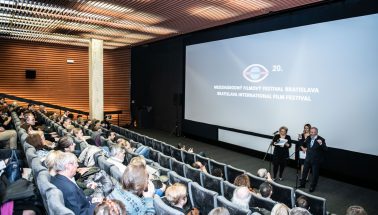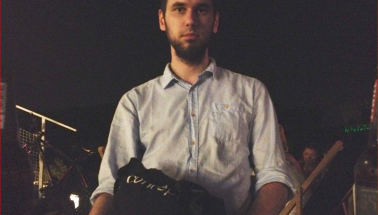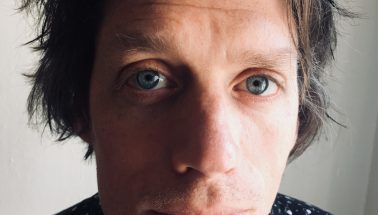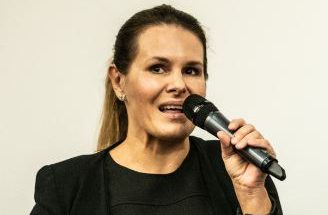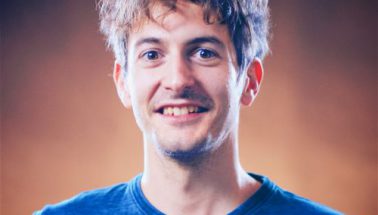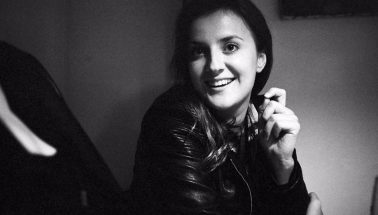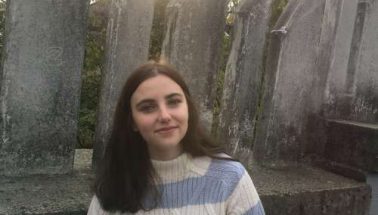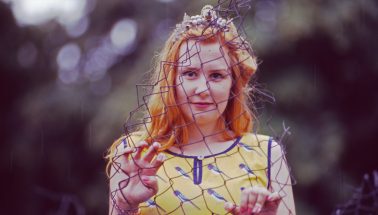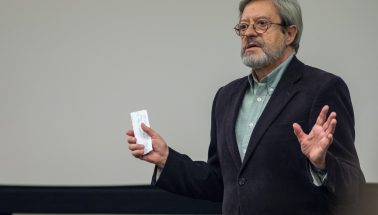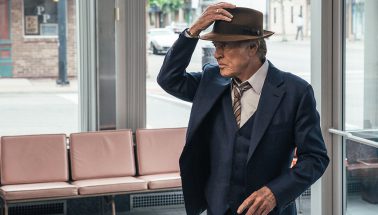Interview
The White World According to Daliborek (2017) and its main protagonist – a “gentle neo-Nazi” have prompted a controversial reaction in the Czech Republic. Klusák came across Dalibor on the Internet.
Through his portrait the director wanted to expose the phenomenon of the Czech pseudo-Nazism, which he finds – just like everything else Czech – sort of alias. The issue at the heart of this media controversy was a debate on the authenticity of a non-actor in a documentary film. Dalibor has become an infamously famous film star.
We’re stylised even in ordinary social interactions. In front of the camera, social actors (Bill Nichols) play themselves. They’re in a role but represent who they are, they do not imitate. With films directed by Peter Kerekes (66 Seasons, Cooking History), Juraj Lehotský (Blind Loves) or Mária Rumanová (Hotel Sunrise), the high level of staging specific of the Slovak documentary films is something the domestic viewer will hardly see as a surprise anymore. In the Czech Republic, Daliborek brought about something new.
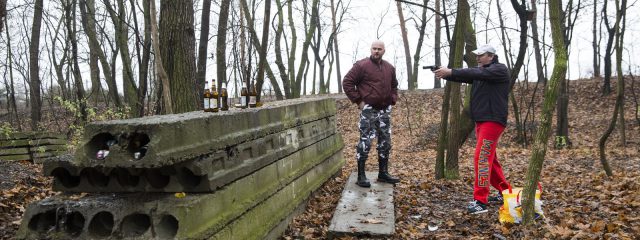
MS: When shooting the film, did you employ the method of staging or reconstruction?
VK: I always object to the term staging and maintain that we used reconstruction. We tried to base the film on situations and moments exactly as we’d found them, staying as faithful to the reality as possible. Since we did have some aesthetic demands, the situations we experienced appear in the film in a stylized form. We did have to interfere at times. There were moments when Dalibor and the rest of his family stopped being themselves. They would either exaggerate or poke fun. So, understandably, the directorial corrective was present. It is necessary to note that I found Dalibor through his online videos, in which he stylizes himself and takes on various forms: he dresses up as an old lady or a soldier and jumps about childishly. I discovered Dalibor as an actor of his own life. In this respect I didn’t feel we were shifting from that significantly.
MS: Didn’t you find it ethically questionable?
VK: For Dalibor, playing himself and taking on different forms was intrinsic. Most of all he liked dressing up as a neo-Nazi because it helped him escape his “hang-ups”. That is why I object when people reproach the film and claim that The White World According to Daliborek is not an honest film about a neo-Nazi. It is a film about a person pretending to be one.
EK: So where do you think are the boundaries between acting and non-acting? Is Dalibor an actor or a non-actor?
VK: These boundaries are somewhat flexible. You are now playing journalists. When I met you a few minutes ago, you were sitting at a table with your friends as friends. Drinking beer that you’d in fact brought here yourself. Now you’ve whipped out your voice recorders, switched from the friends’ table to this journalists’ one, adjusting both your language and attitude. And since I know my words will be rewritten, I’m also speaking in a different way than if we’d spoken at that first table. The three of us are now playing at doing an interview… Dalibor is a non-actor changing identities more frequently than usual people because that’s how he escapes and restarts his identity. He’s using it to face the moments that would otherwise make him uncomfortable. To avoid a question, he will turn it into a joke or, on the contrary, play the tough fascist. He suddenly turns immature, which may be caused by the fact that he still hasn’t managed to break free from his mother’s influence.
EK: So what is so problematic about this film? What made it so provocative?
VK: I’ve heard an interesting thing. It is said that by promotion of any kind of film the filmmakers and the audience are making a sort of an agreement that should be fulfilled. In this regard we allegedly made a mistake of suggesting the film, subtitled “Portrait of a gentle neo-Nazi”, is a study of the Czech neo-Nazism. Somewhere in its PR the film was said to try demythologize the Czech neo-Nazism. By this I meant we’re trying to show it’s a Czech pseudo-Nazism.
It’s neither the Russian offshoot where people are really dying nor the German one that really sets fire to refugee shelters. It’s that Czech sitting in front of the TV and swearing. I really think that the Czech “nazism” is – with an exception of cases such as the horrific arson attack on the Roma girl Natálka, which are fortunately rare – just like everything Czech, sort of alias. That’s what brought a deluge of criticism. In some respects, Daliborek can be considered a very unserious film, which ultimately leads to a clash between the seriousness of its subject-matter and its form. Another divergence of opinion concerns the fact that the film is presented as a documentary, although it was shot using the methods of reconstruction and stylization. Some people find these clashes irritating. Today I bought the new Cinepur with a review yet again confirming that The White World According to Daliborek and its reviewers don’t seem to be on the same page. This particular one says the film is failing on many levels and that a “showman is shooting a film about a showman”.
EK: And is there something wrong with that?
VK: I don’t know, but I personally don’t think I shot the film that way.
EK: I almost cried afterwards. Watching him I felt sick.
VK: And can you write that somewhere? My sound director was just mixing, he didn’t see any of the material we shot. He told me he ’d been laughing the whole time but at the end he’d cried. I’m not trying to say things like this prove the film is done well, but Daliborek certainly isn’t a joke. There’s probably something deeper going on.
EK: Isn’t this turning into some highly stylized Prague café society discussion? What’s the opinion of the ordinary viewer?
VK: I’ve been to almost 20 discussions, most of them less than an hour long, the longest one, hosted by Kamil Fila, lasted four hours. The audience is extremely interested in the characters, their backgrounds, the things left unsaid. Art house cinemas in Prague often say Daliborek is a bridge between their social bubble and the small-town way of life. They’d otherwise never entertain the idea of being interested in the life of someone like Dalibor. They wouldn’t consider that these people are living their authentic fates, have frustrations. It’s like cracking open a window somewhere they otherwise wouldn’t look, or would hold the people living in such environment in contempt. These reflections made me very happy. Well, I don’t know, maybe we’d gathered too much of that bizarreness, but that household really was like that. Were it an open form, let’s say a theatre performance, there are a few things I would change.
MS: Like what?
VK: For instance, I’m missing a scene where Dalibor’s girlfriend Jana confides in him and tells him she’s doing meth. He says that he, as a neo-Nazi, refuses to believe that and that if she’s saying the truth, he can’t continue seeing her. It would really add to the roundness of her character. She replies she didn’t argue with him last time he was bashing the Jews. “I feel more chill,” she said. That’s her way of escaping.
MS: Since you’ve mentioned the theatre, Daliborek draws inspiration from theatrical methods in terms of configuring the shooting location or scenoghraphy. How did this come about?
VK: The director of photography Adam Kruliš and had I set out a strict – stupidly said – “nazi” style of right angles, where verticals are vertical, motion linear, where there’s no diagonal movement, the camera is panning and framing only in large detail and otherwise they’re all just hard-and-fast wholes. This is what we tried to stick to no matter what, which made our possibilities in the tiny claustrophobic flat clear. I believe that setting limitations is a brilliant tool. This also led us to rebuilding the stereotype as we had go back to similar shots. The “stage” of Dalibor’s room stayed more or less the same. We always specified where the characters should move, which also helped us a lot. This was, however, also picked up from their reality. For example, they mostly argued in the kitchen. As Dalibor’s mother didn’t really go in his room, he always went to the kitchen to pick a quarrel. That’s where she’s always sitting with her tablet, constantly illuminated by its light from below. Since they’re using their smartphones and tablets all the time, they’re permanently lit by that neon upward emitted glow. These were some of the art elements we noticed after spending a bit of time with the protagonists in their authentic environment. We strengthened them slightly so that the viewers would notice them as well, even if unconsciously.
EK: How are the protagonists reflecting that? What you’re saying sounds like some kind of a Jungian psychological method of trauma reconstruction. What was their reaction after seeing the film? Has it changed them ?
VK: It is true that the relationship between Dalibor and his mother improved significantly in the course of our shooting. It may be due to the fact that we’d entered their family circle, they all confided in us and we tried discussing it with them, providing them with a kind of our reflection. It cannot be denied that after sixteen years of working at a factory, Dalibor left what felt like a concentration camp, as he used to say. He redid his room completely, unfriended all his facebook neo-Nazi buddies and now is reading a book on Buddhism. Some days ago he wrote to me he was on page sixty. I do n’t know whether it’s the fear of legal consequences or whether something really moved in him.
EK: He didn’t tell you?
VK: He’s too proud to say that we’ve opened or at least crack opened his eyes, but he does feel the need to tell me about all the new things in his life so that I know there’s something going on, I think. So I presume he’s proud of those changes and feels the decision to step out of the “neo-Nazi” stereotype we’d found him in was a good one.
MS: That was, after all, one of the catalysts of the media debate on whether Dalibor shouldn’t be sitting in jail. If he didn’t claim he was an actor, he could really be locked up.
VK: Explaining this is a bit problematic. When we started shooting he told me he would censor his statements because he can’t speak his mind when it comes to the Holocaust, the immigrants or the Roma people. I tried to explain to him that were he to do that, the film would lose all purpose. If he was going to filter it out so that it could be aired on public TV, it was going to suck. We assigned our lawyers a task to come up with how Dalibor could speak his mind and not be jugged. The key was an actors contract. Later discussions on the Internet used it against me. Hoaxes do not only arise out of malevolence but also out of gross carelessness. Many are only interested in the fact that Dalibor had an actors contract, which automatically makes him an actor. They refuse to acknowledge that it was just a cover-up to protect someone claiming true allegiance to neo-Nazism from legal consequences. This might be the first time I’ve actually managed to put it in a way I understand himself.
In the media however, we cast some doubts upon it. The deal was giving Dalibor an actors contract provided he doesn’t tell anyone or he’d face a conventional fine. Of course, he spilled the beans right after the premiere in Karlovy Vary. Naturally I didn’t want any of his money, but conventional fine is a very well-enforceable legal instrument.
MS: Was there any conscious or rather strategic mystification on your side when doing the film campaign?
VK: In the presentation of the film, we didn’t resort to any mystification, on the contrary, we wanted to talk about the film in all honesty. Unlike the Slovak documentary context, it is quite unusual in the Czech Republic, I know, but I was a bit upset that the wiser part of our film criticism scene had reacted with a negative attitude . Foreign reviews are very positive and don’t doubt the method we used. Even the affair with the protagonist of Vladimir, who was said to be actor, is fabricated. Zuzana Piussi, who claims he is an actor, got this “first-hand information” by contacting him on Facebook. It was his first time in front of a camera. Because of the wild nineties in Bratislava he supposedly spent a long time hiding in Italy.
MS: Was your surprise entry in front of the camera at the end of the film a planned or a spontaneous idea?
VK: Not at all. The review I’ve mentioned says it was perfectly staged. I didn’t wish to occur anywhere in this film, that’s why I also shot it in a way completely different from my previous ones. But when I heard Dalibor ironizing Mrs Liskova, who had survived Auschwitz only by accident, I got extremely angry. In some versions the scene wasn’t included in the film, but then the dramaturge Lucia Králová said it was another important layer we must put there because it basically shows we’re admitting the method had failed. According to another dramaturge, Jan Gogola jr., we removed the responsibility for viewers to deal with the testimony of Dalibor themselves.
I think the real life of this film will start only after its television premiere sometime in the spring. Currently, it’s somewhere in the documentary ghetto, seen by roughly twenty thousand viewers either in cinemas or via the VOD platform DAfilms.cz. My ambition was to make this film speak to the people that aren’t regulars at the festival in Jihlava.
EK: To conclude, could you tell us your definition of a documentary film?
VK: For me, a documentary film should make the invisible visible. The problem lies in the ghetto-character of the Czech society. In the past, its mixing used to be a big plus. You’d have a pub where doctors, workers, judges and priests would sit at one table and a lady with primary school education would wait on them while they’re discussing whether Václav Havel is a good president. In the US or UK, where meeting people happens mostly within a class , this is not a thing. In my opinion a documentary should exceed these bubbles.
Matej Sotník, Eva Križková
Vít Klusák (1980) is a Czech documentary filmmaker living in Prague. After finishing the documentary filmmaking programme at Prague’s FAMU, where he now teaches, he partnered with Filip Remunda and produced their successful mystification debut Czech Dream (Český sen, 2004), a criticism of a media bubble surrounding the Czech Republic’s accession to the EU. The creative tandem of Klusák and Remuda founded a production company Hypermarket Film they’re still running and went on producing films such as Czech Peace (2010), which premiered at Michael Moore’s festival in Traverse City or The Good Driver Smetana (2013), which Vít Klusák has a strong personal relationship with. Some of Klusák’s most visible recent projects include his Czech Television documentary series called Czech Journal, several episodes of the legendary Kitchen Nightmares for Prima TV or a documentary film Matrix AB (2015) portraying the oligarch Babiš. Right now it’s The White World According to Daliborek (2017).
